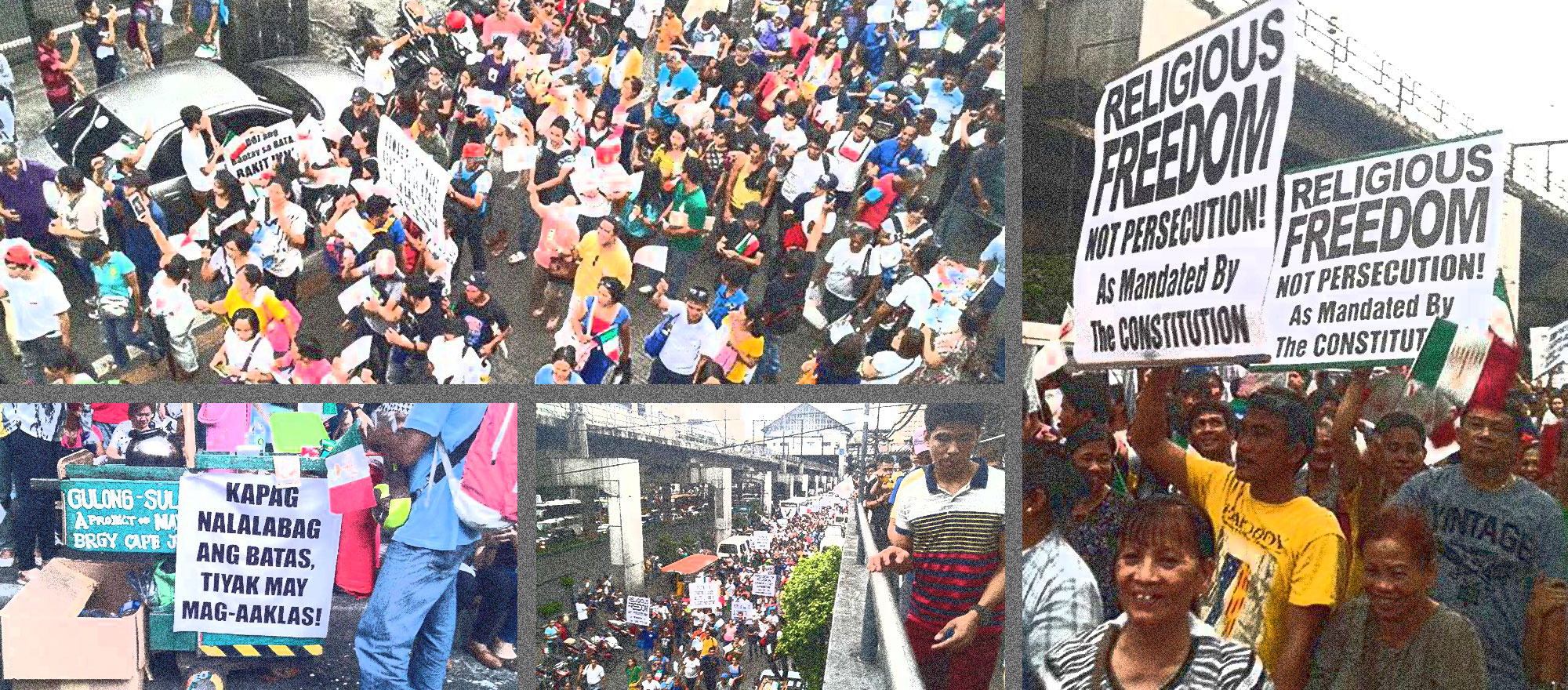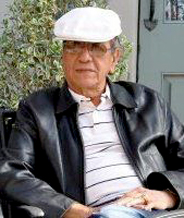The Church is not an island: Lessons from the INC rallies
Defending rights, or defending political privilege? Carlo Redentor shares his observations on this rare political display from a Church that is usually reticent from public view.

“Separation of Church and State” was the catchphrase of the controversial Iglesia ni Cristo rallies of late. The INC argues that the state should not meddle in “internal matters,” that is, the rift within INC which sprang internally from a social media campaign. For the Church, this resulted in excommunications, and for the State, a non-bailable case of serious illegal detention.
The INC has reason to be bothered. Such a seemingly small (and in their view, internal) concern was suddenly elevated to national importance, handled personally by the Department of Justice (DOJ) via Justice Sec. Leila de Lima herself. Why is there a suspiciously speedy and specialized handling of the issue, when, as the INC argue in their rally, no substantial action has been taken on more grave cases like the Mamasapano incident, which claimed the lives of many combatants and civilians alike? Certainly, there is an irregularity here.
However, there are many irregularities which surround–and, to the general public, complicate–the issue. After all, when you tackle the Church and the State, both institutions wracked with too many irregularities, it is bound to boggle the pedestrian mind.
The INC has garnered the ire of the general public, mainly because of the apocalyptic traffic jams caused by their mobilizations at Padre Faura Street in Manila and around the EDSA Shrine in Mandaluyong. That, however, is small-minded of its detractors. Such inconvenience, no matter how exhausting after a long workday, is a small price to pay. Democracy is founded on the sacrosanct freedom to assemble, mobilize, and speak out–and yes, this includes the right to rant on social media. It is everybody’s right, members of INC included, to do so.

If any, the INC has merely been the whipping-boy for long-standing public rage against the general horror of traffic and public transportation in the Metro, of which the government (and by government that includes certain private individuals like the cronies of Mar Roxas and Joseph Abaya) is at fault. It is not the INC’s fault that ordinary citizens have to endure traffic and inefficiency, though they could certainly have been more sensitive in the conduct of their mobilizations given the dire situation.
Let it be clear that the recent rallies are a political, and not religious, intervention. The exercise of religious belief and the freedom to organize are political rights, and the defense of such rights is a political act. It is the right of the INC to stage political mass actions should they feel that their freedoms are being threatened.
In the public arena, however, what is off-putting is the INC’s selectiveness in applying this right. Numerous major issues emerged in the past year alone, but the silence of the INC on such issues in the public sphere has been deafening, though tacitly accepted by the public because of the INC’s firm doctrine which disallows participation in political actions, labor unions, and so forth. In the eyes of the public, the INC simply doesn’t meddle in such affairs; that is their choice, and as much as they have a right to speak out, it is also well within the INC’s rights to be silent.
This week’s INC rallies, unprecedented in recent history since the INC-backed pro-Estrada EDSA Tres, broke that silence in grand fashion, true to the style of an organization with massive resources and influence. For the general public, it is eyebrow-raising to say the least. So many major issues of public interest have emerged, and these affect INC members too, like contractualization, low wages, soaring prices of basic commodities, corruption, landlessness among peasants, the privatization of public transport like the MRT and LRT. (Some of these issues even have facets particular to the INC: contractualization, for example, sees greedy employers like Henry Sy’s SM specifically exploiting INC doctrine for profit by preferring INC members for their workforce, simply because of their disavowal of unionism, thus less likely to assert workers’ rights.)

And yet, there has been no public participation by the INC in these crucial issues. That they are suddenly at the forefront defending a particular right—one among many that need to be defended—gives the impression of being self-serving, as if religious freedom is the only issue that needs urgent and widespread political action. The message, whether intentional or not, is that other national issues do not seem compelling enough for the INC’s participation, but the Church is quick to mobilize an action of EDSA proportions on an issue stemming from an internal matter. This selectiveness can easily be perceived as an affront, albeit indirectly, to those who have tirelessly defended the public interest on many other important issues plaguing the country.
Furthermore, there is a perceived shortsightedness, or perhaps even complicity, regarding the INC’s unspoken political privilege. Public officials (and 2016 wannabes) are doubling over backwards to pander to the INC. Politicians are obviously careful in their choice of words and actions so that they may not offend the INC, a formidable bloc-voting force in the upcoming polls. This kid-gloves treatment is a stark irregularity; other groups are afforded little of that regard. Just for the INC, the local governments of Manila and Mandaluyong have speedily issued permits to rally, allowing them to protest for days plus extensions. Some officials even offered police escorts and transportation. No police phalanx, no barricades, no violent water-cannon dispersals. In comparison, the anti-pork barrel rally in Luneta last year was merely granted a permit to protest for a few hours. This year’s SONA rally along Commonwealth Avenue was not even granted a permit (neither accepted nor denied, simply ignored by the local government) even if the request was filed days in advance. The peaceful SONA rally was met with container vans, concertina wires, and thousands of deployed police—none of which were to be seen in the INC’s more spontaneous EDSA rally. Yes, INC members are merely exercising their freedoms, but it is an exercise that is unevenly applied, and they themselves should be able to recognize that irregularity.
One thing is clear: with this week’s rallies, the public has seen the INC awaken from its political passivity. We are now aware (painfully, for commuters) of the Church’s speed, efficiency, and power when it comes to the defense of its rights. We have seen them affirm the value of political mass action in the public sphere. The challenge to INC is to wield its power more effectively, and channel it for the good not just of its membership, but of the larger public. Perhaps it is time for the INC to emerge from its exclusivist bubble that hinders it from engaging in resolutions which transcend its membership. Perhaps with a more responsible and judicious use of its power on larger issues, the INC can develop more empathy and solidarity from the general population. Many issues of public interest remain unresolved, and we hope to see the INC’s participation, with the same urgency and decisiveness, in our collective struggles. The Church is separate from the State, but it is not separate from the people.




